- Home
- H. Rider Haggard
King Solomon's Mines (Barnes & Noble Classics Series) Page 23
King Solomon's Mines (Barnes & Noble Classics Series) Read online
Page 23
A look at the white forms seated on the stone bench that ran around that ghastly board confirmed this view. They were human forms indeed, or rather had been human forms; now they were stalactites. This was the way in which the Kukuana people had from time immemorial preserved their royal dead. They petrified them. What the exact system was, if there was any, beyond placing them for a long period of years under the drip, I never discovered, but there they sat, iced over and preserved for ever by the silicious fluid. Anything more awe-inspiring than the spectacle of this long line of departed royalties, wrapped in a shroud of ice-like spar, through which the features could be dimly made out (there were twenty-seven of them, the last being Ignosi’s father), and seated round that inhospitable board, with Death himself for a host, it is impossible to imagine. That the practice of thus preserving their kings must have been an ancient one is evident from the number, which, allowing for an average reign of fifteen years, would, supposing that every king who reigned was placed here—an improbable thing, as some are sure to have perished in battle far from home—fix the date of its commencement at four and a quarter centuries back. But the colossal Death, who sits at the head of the board, is far older than that, and unless I am much mistaken, owes his origin to the same artist who designed the three colossi. He was hewn out of a single stalactite, and, looked at as a work of art, was most admirably conceived and executed. Good, who understood anatomy, declared that so far as he could see the anatomical design of the skeleton was perfect down to the smallest bones.
My own idea is, that this terrific object was a freak of fancy on the part of some old-world sculptor, and that its presence had suggested to the Kukuanas the idea of placing their royal dead under its awful presidency. Or perhaps it was placed there to frighten away any marauders who might have designs upon the treasure chamber beyond. I cannot say. All I can do is to describe it as it is, and the reader must form his own conclusion.
Such, at any rate, was the White Death, and such were the White Dead!
Chapter 17
Solomon’s Treasure Chamber
WHILE WE HAD BEEN engaged in getting over our fright, and in examining the grisly wonders of the place, Gagool had been differently occupied. Somehow or other—for she was marvellously active when she chose—she had scrambled on to the great table, and made her way to where our departed friend Twala was placed, under the drip, to see, suggested Good, how he was “pickling,” or for some dark purpose of her own. Then she came hobbling back, stopping now and again to address a remark (the tenor of which I could not catch) to one or other of the shrouded forms, just as you or I might greet an old acquaintance. Having gone through this mysterious and horrible ceremony, she squatted herself down on the table immediately under the White Death, and began, so far as I could make out, to offer up prayers to it. The spectacle of this wicked old creature pouring out supplications (evil ones, no doubt) to the arch enemy of mankind, was so uncanny that it caused us to hasten our inspection.
“Now, Gagool,” said I, in a low voice—somehow one did not dare to speak above a whisper in that place—“lead us to the chamber.”
The old creature promptly scrambled down off the table.
“My lords are not afraid?” she said, leering up into my face.
“Lead on.”
“Good, my lords;” and she hobbled round to the back of the great Death. “Here is the chamber; let my lords light the lamp, and enter,” and she placed the gourd full of oil upon the floor, and leaned herself against the side of the cave. I took out a match, of which we still had a few in a box, and lit the rush wick, and then looked for the doorway, but there was nothing before us but the solid rock. Gagool grinned. “The way is there, my lords.”
“Do not jest with us,” I said, sternly.
“I jest not, my lords. See!” and she pointed at the rock.
As she did so, on holding up the lamp we perceived that a mass of stone was slowly rising from the floor and vanishing into the rock above, where doubtless there was a cavity prepared to receive it. The mass was of the width of a good-sized door, about ten feet high and not less than five feet thick. It must have weighed at least twenty or thirty tons, and was clearly moved upon some simple balance principle, probably the same as that upon which the opening and shutting of an ordinary modern window is arranged. How the principle was set in motion, of course none of us saw; Gagool was careful to avoid that; but I have little doubt that there was some very simple lever, which was moved ever so little by pressure on a secret spot, thereby throwing additional weight on to the hidden counterbalances, and causing the whole huge mass to be lifted from the ground. Very slowly and gently the great stone raised itself, till at last it had vanished altogether, and a dark hole presented itself to us in the place which it had filled.
Our excitement was so intense, as we saw the way to Solomon’s treasure chamber at last thrown open, that I for one began to tremble and shake. Would it prove a hoax after all, I wondered, or was old Da Silvestra right? and were there vast hoards of wealth stored in that dark place, hoards which would make us the richest men in the whole world? We should know in a minute or two.
“Enter, white men from the stars,” said Gagool, advancing into the doorway; “but first hear your servant, Gagaoola the old. The bright stones that ye will see were dug out of the pit over which the Silent Ones are set, and stored here, I know not by whom. But once has this place been entered since the time that those who stored in the stones departed in haste, leaving them behind. The report of the treasure went down among the people who lived in the country from age to age, but none knew where the chamber was, nor the secret of the door. But it happened that a white man reached this country from over the mountains, perchance he too came ‘from the stars,’ and was well received of the king of the day. He it is who sits yonder,” and she pointed to the fifth king at the table of the dead. “And it came to pass that he and a woman of the country who was with him came to this place, and that by chance the woman learnt the secret of the door—a thousand years might ye search, but ye should never find it. Then the white man entered with the woman, and found the stones, and filled with stones the skin of a small goat, which the woman had with her to hold food. And as he was going from the chamber he took up one more stone, a large one, and held it in his hand.” Here she paused.
“Well,” I asked, breathless with interest as we all were, “what happened to Da Silvestra?”
The old hag started at the mention of the name.
“How knowest thou the dead man’s name?” she asked, sharply; and then, without waiting for an answer, went on—
“None know what happened; but it came about that the white man was frightened, for he flung down the goat-skin, with the stones, and fled out with only the one stone in his hand, and that the king took, and it is the stone that thou, Macumazahn, didst take from Twala’s brows.”
“Have none entered here since?” I asked, peering again down the dark passage.
“None, my lords. Only the secret of the door hath been kept, and every king hath opened it, though he hath not entered. There is a saying, that those who enter there will die within a moon, even as the white man died in the cave upon the mountain, where ye found him, Macumazahn. Ha! ha! mine are true words.”
Our eyes met as she said it, and I turned sick and cold. How did the old hag know all these things?
“Enter, my lords. If I speak truth the goat-skin with the stones will lie upon the floor; and if there is truth as to whether it is death to enter here, that will ye learn afterwards. Ha! ha! ha! ” And she hobbled through the doorway, bearing the light with her; but I confess that once more I hesitated about following.
“Oh, confound it all!” said Good, “here goes. I am not going to be frightened by that old devil;” and followed by Foulata, who, however, evidently did not at all like the job, for she was shivering with fear, he plunged into the passage after Gagool—an example which we quickly followed.
A few yards down the passage, in
the narrow way hewn out of the living rock, Gagool had paused, and was waiting for us.
“See, my lords,” she said, holding the light before her, “those who stored the treasure here fled in haste, and bethought them to guard against any who should find the secret of the door, but had not the time,” and she pointed to large square blocks of stone, which had, to the height of two courses (about two feet three), been placed across the passage with a view to walling it up. Along the side of the passage were similar blocks ready for use, and, most curious of all, a heap of mortar and a couple of trowels, which, so far as we had time to examine them, appeared to be of a similar shape and make to those used by workmen to this day.
Here Foulata, who had throughout been in a state of great fear and agitation, said that she felt faint and could go no farther, but would wait there. Accordingly we set her down on the unfinished wall, placing the basket of provisions by her side, and left her to recover.
Following the passage for about fifteen paces farther, we suddenly came to an elaborately painted wooden door. It was standing wide open. Whoever was last there had either not had the time, or had forgotten, to shut it.
Across the threshold lay a skin bag, formed of a goat-skin, that appeared to be full of pebbles.
“Hee! hee! white men,” sniggered Gagool, as the light from the lamp fell upon it. “What did I tell ye, that the white man who came here fled in haste, and dropped the woman’s bag—behold it!”
Good stooped down and lifted it. It was heavy and jingled.
“By Jove! I believe it’s full of diamonds,” he said, in an awed whisper ; and, indeed, the idea of a small goat-skin full of diamonds is enough to awe anybody.
“Go on,” said Sir Henry, impatiently. “Here, old lady, give me the lamp,” and taking it from Gagool’s hand, he stepped through the doorway and held it high above his head.
We pressed in after him, forgetful, for the moment, of the bag of diamonds, and found ourselves in Solomon’s treasure chamber.
At first, all that the somewhat faint light given by the lamp revealed was a room hewn out of the living rock, and apparently not more than ten feet square. Next there came into sight, stored one on the other as high as the roof, a splendid collection of elephant-tusks. How many of them there were we did not know, for of course we could not see how far they went back, but there could not have been less than the ends of four or five hundred tusks of the first quality visible to our eyes. There, alone, was enough ivory before us to make a man wealthy for life. Perhaps, I thought, it was from this very store that Solomon drew his material for his “great throne of ivory,”1 of which there was not the like made in any kingdom.
On the opposite side of the chamber were about a score of wooden boxes, something like Martini-Henry ammunition boxes,2 only rather larger, and painted red.
“There are the diamonds,” cried I; “bring the light.”
Sir Henry did so, holding it close to the top box, of which the lid, rendered rotten by time even in that dry place, appeared to have been smashed in, probably by Da Silvestra himself. Pushing my hand through the hole in the lid I drew it out full, not of diamonds, but of gold pieces, of a shape that none of us had seen before, and with what looked like Hebrew characters stamped upon them.
“Ah!” I said, replacing the coin, “we shan’t go back empty-handed, anyhow. There must be a couple of thousand pieces in each box, and there are eighteen boxes. I suppose it was the money to pay the workmen and merchants.”
“Well,” put in Good, “I think that is the lot; I don’t see any diamonds, unless the old Portuguese put them all into this bag.”
“Let my lords look yonder where it is darkest, if they would find the stones,” said Gagool, interpreting our looks. “There my lords will find a nook, and three stone chests in the nook, two sealed and one open.”
Before interpreting this to Sir Henry, who had the light, I could not resist asking how she knew these things, if no one had entered the place since the white man, generations ago.
“Ah, Macumazahn, who watchest by night,” was the mocking answer, “ye who live in the stars, do ye not know that some have eyes that can see through rock?”
“Look in that corner, Curtis,” I said, indicating the spot Gagool had pointed out.
“Hullo, you fellows,” he said, “here’s a recess. Great heavens! look here.”
We hurried up to where he was standing in a nook, something like a small bow window. Against the wall of this recess were placed three stone chests, each about two feet square. Two were fitted with stone lids, the lid of the third rested against the side of the chest, which was open.
“Look!” he repeated, hoarsely, holding the lamp over the open chest. We looked, and for a moment could make nothing out, on account of a silvery sheen that dazzled us. When our eyes got used to it, we saw that the chest was three-parts full of uncut diamonds, most of them of considerable size. Stooping, I picked some up. Yes, there was no mistake about it, there was the unmistakable soapy feel about them.
I fairly gasped as I dropped them.
“We are the richest men in the whole world,” I said. “Monte Christo3 is a fool to us.”
“We shall flood the market with diamonds,” said Good.
“Got to get them there first,” suggested Sir Henry.
And we stood with pale faces and stared at each other, with the lantern in the middle, and the glimmering gems below, as though we were conspirators about to commit a crime, instead of being, as we thought, the three most fortunate men on earth.
“Hee! hee! hee!” went old Gagool behind us, as she flitted about like a vampire bat. “There are the bright stones that ye love, white men, as many as ye will; take them, run them through your fingers, eat of them, hee! hee! drink of them, ha! ha!”
There was something so ridiculous at that moment to my mind in the idea of eating and drinking diamonds, that I began to laugh outrageously, an example which the others followed, without knowing why. There we stood and shrieked with laughter over the gems which were ours, which had been found for us thousands of years ago by the patient delvers in the great hole yonder, and stored for us by Solomon’s long-dead overseer, whose name, perchance, was written in the characters stamped on the faded wax that yet adhered to the lids of the chest. Solomon never got them, nor David, nor Da Silvestra, nor anybody else. We had got them; there before us were millions of pounds’ worth of diamonds, and thousands of pounds’ worth of gold and ivory, only waiting to be taken away.
Suddenly the fit passed off, and we stopped laughing.
“Open the other chests, white men,” croaked Gagool, “there are surely more therein. Take your fill, white lords!”
Thus adjured, we set to work to pull up the stone lids on the other too, first—not without a feeling of sacrilege—breaking the seals that fastened them.
Hoorah! they were full too, full to the brim; at least, the second one was; no wretched Da Silvestra had been filling goat-skins out of that. As for the third chest, it was only about a fourth full, but the stones were all picked ones; none less than twenty carats, and some of them as large as pigeon-eggs. Some of these biggest ones, however, we could see by holding them up to the light, were a little yellow, “off coloured,” as they call it at Kimberley.
What we did not see, however, was the look of fearful malevolence that old Gagool favoured us with as she crept, crept like a snake, out of the treasure chamber and down the passage towards the massive door of solid rock.
Hark! Cry upon cry comes ringing up the vaulted path. It is Foulata’s voice!
“Oh, Bougwan! help! help! the rock falls!”
“Leave go, girl! Then—”
“Help! help! she has stabbed me!”
By now we are running down the passage, and this is what the light from the lamp falls on. The door of rock is slowly closing down; it is not three feet from the floor. Near it struggle Foulata and Gagool. The red blood of the former runs to her knee, but still the brave girl holds the old witch, w
ho fights like a wild cat. Ah! she is free! Foulata falls, and Gagool throws herself on the ground, to twist herself like a snake through the crack of the closing stone. She is under—ah. God! too late! too late! The stone nips her, and she yells in agony. Down, down, it comes, all the thirty tons of it, slowly pressing her old body against the rock below. Shriek upon shriek, such as we never heard, then a long sickening crunch, and the door was shut just as we, rushing down the passage, hurled ourselves against it.
It was all done in four seconds.
Then we turned to Foulata. The poor girl was stabbed in the body, and could not, I saw, live long.
“Ah! Bougwan, I die!” gasped the beautiful creature. “She crept out—Gagool; I did not see her, I was faint—and the door began to fall; then she came back, and was looking up the path—and I saw her come in through the slowly falling door, and caught her and held her, and she stabbed me, and I die, Bougwan.”
“Poor girl! poor girl!” Good cried; and then, as he could do nothing else, he fell to kissing her.
“Bougwan,” she said, after a pause, “is Macumazahn there? it grows so dark, I cannot see.”
“Here I am, Foulata.”
“Macumazahn, be my tongue for a moment, I pray thee, for Bougwan cannot understand me, and before I go into the darkness—I would speak a word.”
“Say on, Foulata, I will render it.”
“Say to my lord, Bougwan, that—I love him, and that I am glad to die because I know that he cannot cumber his life with such as me, for the sun cannot mate with the darkness, nor the white with the black.
“Say that at times I have felt as though there were a bird in my bosom, which would one day fly hence and sing elsewhere. Even now, though I cannot lift my hand, and my brain grows cold, I do not feel as though my heart were dying; it is so full of love that could live a thousand years, and yet be young. Say that if I live again, mayhap I shall see him in the stars, and that—I will search them all, though perchance I should there still be black and he would—still be white. Say—nay, Macumazahn, say no more, save that I love—Oh, hold me closer, Bougwan, I cannot feel thine arms—oh! oh!”

 The Ivory Child
The Ivory Child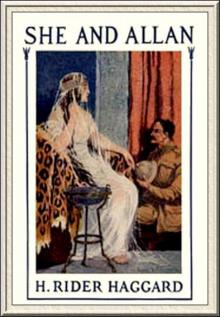 She and Allan
She and Allan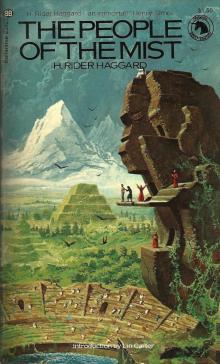 The People of the Mist
The People of the Mist She
She Morning Star
Morning Star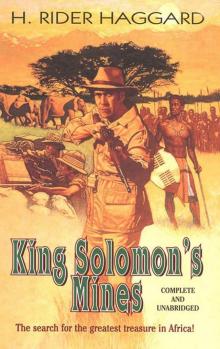 King Solomon's Mines
King Solomon's Mines She: A History of Adventure
She: A History of Adventure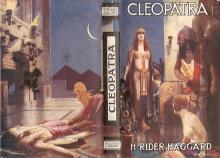 Cleopatra
Cleopatra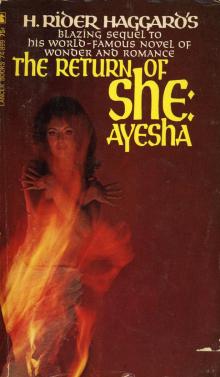 Ayesha, the Return of She
Ayesha, the Return of She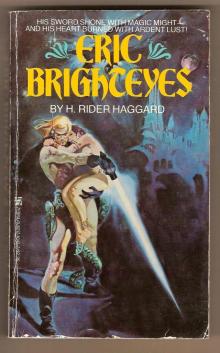 Eric Brighteyes
Eric Brighteyes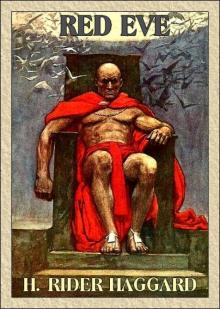 Red Eve
Red Eve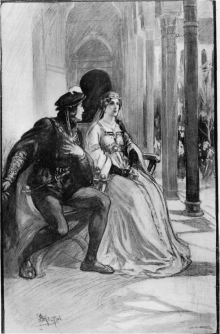 Fair Margaret
Fair Margaret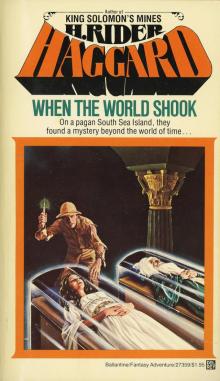 When the World Shook
When the World Shook Lysbeth, a Tale of the Dutch
Lysbeth, a Tale of the Dutch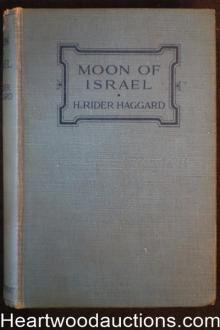 Moon of Israel: A Tale of the Exodus
Moon of Israel: A Tale of the Exodus Long Odds
Long Odds The Ghost Kings
The Ghost Kings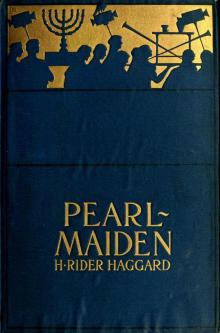 Pearl-Maiden: A Tale of the Fall of Jerusalem
Pearl-Maiden: A Tale of the Fall of Jerusalem Allan and the Holy Flower
Allan and the Holy Flower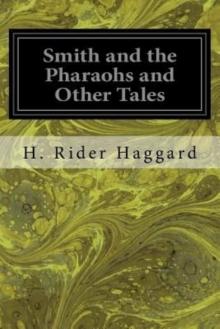 Smith and the Pharaohs, and other Tales
Smith and the Pharaohs, and other Tales The Wanderer's Necklace
The Wanderer's Necklace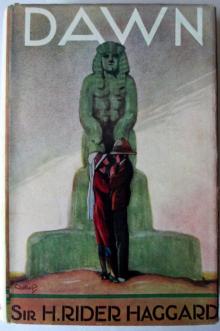 Dawn
Dawn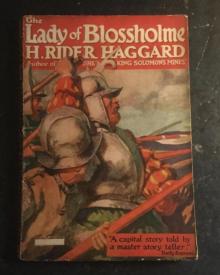 The Lady of Blossholme
The Lady of Blossholme Stella Fregelius: A Tale of Three Destinies
Stella Fregelius: A Tale of Three Destinies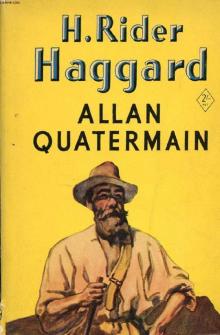 Allan Quatermain
Allan Quatermain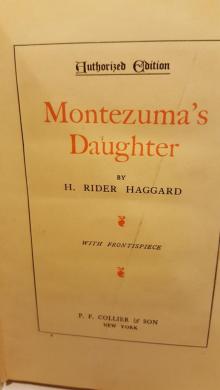 Montezuma's Daughter
Montezuma's Daughter Jess
Jess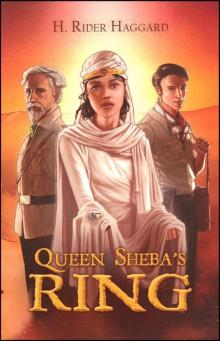 The Brethren
The Brethren Allan's Wife
Allan's Wife Child of Storm
Child of Storm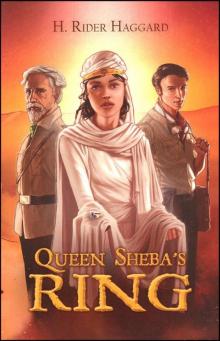 Queen Sheba's Ring
Queen Sheba's Ring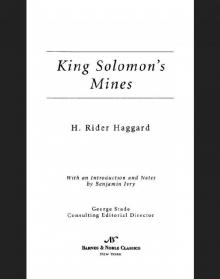 King Solomon's Mines (Barnes & Noble Classics Series)
King Solomon's Mines (Barnes & Noble Classics Series)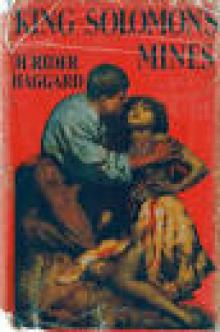 Complete Allan Quatermain Omnibus - Volumes 1 - 10
Complete Allan Quatermain Omnibus - Volumes 1 - 10